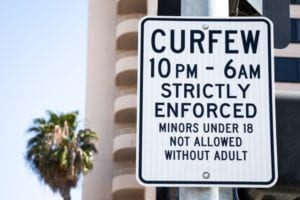Legally Reviewed By:
Brian P. Gabriel, Esquire
 Curfew laws are designed to mitigate the potential for adolescents to become crime victims. By the same token, they aim to keep minors out of trouble and reduce criminal activity. The state’s curfew law designates specific periods during which young people under 16 may not be out unattended.
Curfew laws are designed to mitigate the potential for adolescents to become crime victims. By the same token, they aim to keep minors out of trouble and reduce criminal activity. The state’s curfew law designates specific periods during which young people under 16 may not be out unattended.
In Florida, each county and city must enact an ordinance to activate state curfew laws. Adolescents may be charged with a civil infraction if caught violating curfew.
Florida Curfew Law
The Florida curfew law prohibits adolescents under 16 from being out in public unattended between the hours of 11 p.m. and 5 a.m. Sunday through Thursday, unless it is a legal holiday. On Saturdays, Sundays, and legal holidays, minors under 16 may not be out in public unattended between the hours of 12:01 a.m. and 6 a.m.
Minors who have been expelled from school are also prohibited from being out during the day. A juvenile who has been suspended or expelled may not be or remain in a public place, an establishment, or within 1,000 feet of a school between the hours of 9:00 a.m. to 2:00 p.m. during any school day.
Individual cities and counties can set their different time frames, which might provide more leeway or tighter restrictions than state laws. Whether these laws are enforced varies. In Palm Beach County, police officers have been known to make arrests for violating curfew. During Hurricane Irma, authorities arrested 100 people for violating the county ordinance. Palm Beach County updated the curfew to run from 10 p.m. to 6 a.m. following the storm. The city of West Palm Beach followed suit.
Consequences of Curfew Violations in Florida
Penalties for curfew violations vary. A first-time curfew violator will likely receive a written warning. Violation #2 and on count as civil infractions for which penalties may include a $50 fine for each violation. A teen caught violating curfew may be taken into police custody. Teens who are not being booked in connection to another crime will have their parents called.
A curfew violation might seem harmless, but it can impact a teen’s future because it shows up on a juvenile record. Curfew violations may be removed from a teen’s record when he reaches adulthood, but he must apply to have the record expunged.
Juvenile Criminal Defense in West Palm Beach
Juveniles who get in trouble with law enforcement often set themselves up for struggles later in life. It’s important to defend juvenile charges immediately. At The Law Office of Gabriel & Gabriel, attorney Brian Gabriel has over 30 years of experience defending the criminally accused. He dedicates his career to navigating justice for criminally-accused adults and juveniles in Palm Beach County. Contact Mr. Gabriel at 561-622-5575 for a free consultation or email Mr. Gabriel about your case.



